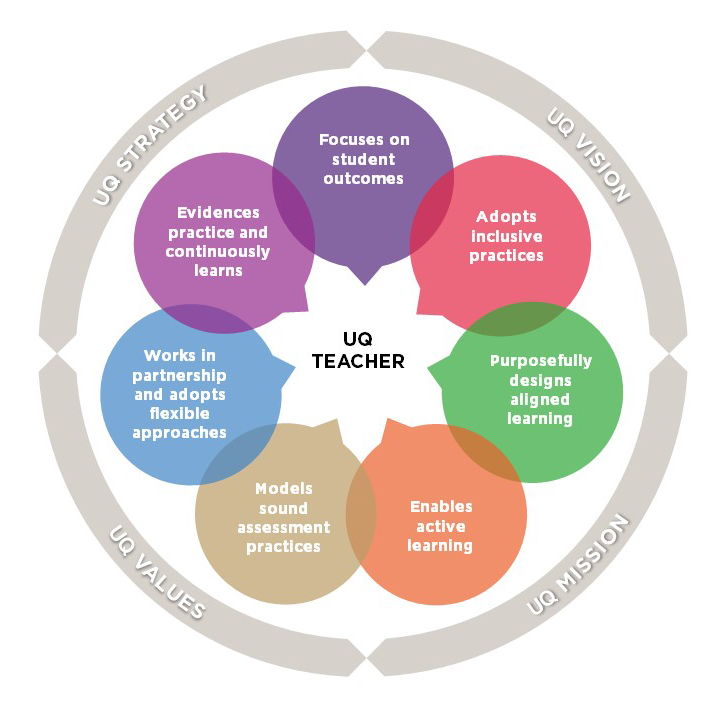Teaching Expertise Framework (TEF)
UQ's Teaching Expertise Framework (TEF) identifies what expertise university teachers, at various career stages, can be expected to have developed, thus identifying the core capabilities they might need to engage at various points across a career span.
The Framework – see TEF summary (PDF, 120.3 KB) – outlines the type of teaching expertise and educational leadership that is desired at UQ across multiple domains of expertise. It draws on scholarly literature related to higher education teaching and learning and was developed in consultation with multiple stakeholder groups across UQ.
The Framework is designed to ensure that there is close alignment with UQ’s strategy, including but not limited to the Teaching and Learning Plan and the Reconciliation Action Plan (RAP). It also aligns with the UQ academic promotion criteria, the Professional Standards Framework for teaching and supporting learning in higher education that leads to the Higher Education Academy (HEA) Fellowship, and the Australian University Teaching Criteria and Standards Framework.

Figure: UQ Teaching Expertise Framework diagram
About the Teaching Expertise Framework (TEF)
Intention and possible uses
This Framework provides a scholarly approach to recognise the breadth of characteristics involved in the development of teaching expertise in higher education across all career stages.
We envision a variety of uses of the Framework to guide:
| Design of professional learning in teaching and learning pathways | Outlining the curriculum underpinning professional learning activities. This curriculum is designed to support the development of the teaching expertise required to support optimal learning and student experiences at UQ. |
|---|---|
| Navigation of professional learning pathways | Helping all UQ teachers to find meaning in the everyday activities that ultimately develop teaching expertise and to pursue informal and formal professional learning activities that enhance their skills, capacities and capabilities. |
| Achievement of academic performance standards | Supporting the University’s commitment to recruiting, developing and retaining skilled, experienced and high-performing staff (PPL Criteria for Academic Performance Policy). |
| Self-reflection | Guiding all UQ teachers including academics, tutors, lab demonstrators, clinical teachers and graduate students in ways to identify and communicate their strengths and recognise particular aspects of their teaching for further development. |
| Dialogue | Supporting school/department heads and other campus leaders to nurture individual teachers and contribute to teaching and learning cultures across UQ. |
The Development Continuum
The Teaching Expertise Framework recognises that the domains and dimensions of teaching expertise are developed across a continuum: from exploration through to engagement and then enhancement, as shown below.
The Framework is incremental and presupposes that those who identify with the Enhance phase have accrued the capabilities outlined in the Explore or Engage phases. It is expected that teachers will move across the domains and dimensions, back and forth, along this continuum, throughout their careers as they discover that the teaching expertise needed changes over time.

Scope of practice
Each phase of the continuum loosely maps onto the level of experience, sphere of influence and teaching practice to target a particular audience for engaging with professional learning.
| Phase of development | EXPLORE Growth of self in a local context | ENGAGE Actively participates in, implements new strategies, seeks out opportunities | ENHANCE Contributes to the growth of others and of the field, expands upon knowledge |
|---|---|---|---|
| Level of experience | New to higher education; new to teaching; new to learning support; new to a particular practice; new to UQ | Experienced teacher and/or learning and teaching support | Highly practiced teacher and/or learning and teaching support, experienced program coordinator, leader of learning and teaching |
| Sphere of influence | Self and students | Teaching team and/or colleagues | Colleagues in discipline, program, school or department |
| Focus of practice | Class, module or course | Course, plan or program | Learning and teaching strategy and/ or governance; within and beyond UQ and/ or sector, nationally and internationally |
| Types of activity | Learning and teaching delivery and/or support | Learning and teaching design, development, delivery and/or support | Institutional and/or discipline-based management of learning, teaching and curriculum; engagement in formal review, benchmarking and strategic planning; innovation of practice |
TEF summary: key learning outcomes
The TEF summary (PDF, 120.3 KB) covers the following key learning outcomes:
- Supporting student learning
- Curriculum and assessment
- Pedagogy
- Engagement and reflection
- Educational leadership.
Reference
Gannaway, D., Moni, K., McGrath, D., Kavanagh, L., Lynch, Y. (2020). The Teaching Expertise Framework. Brisbane, Australia: The University of Queensland
